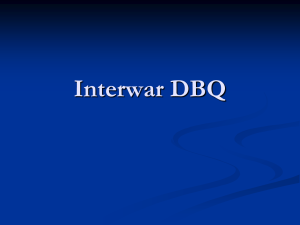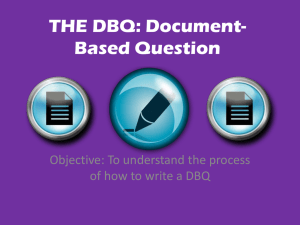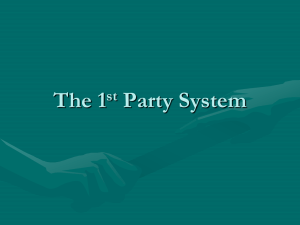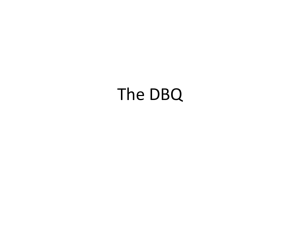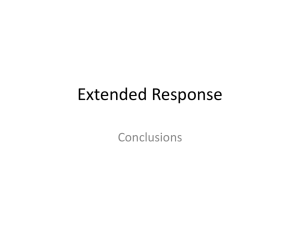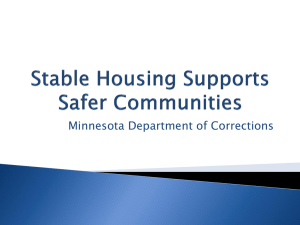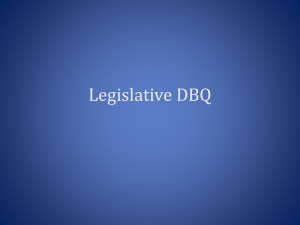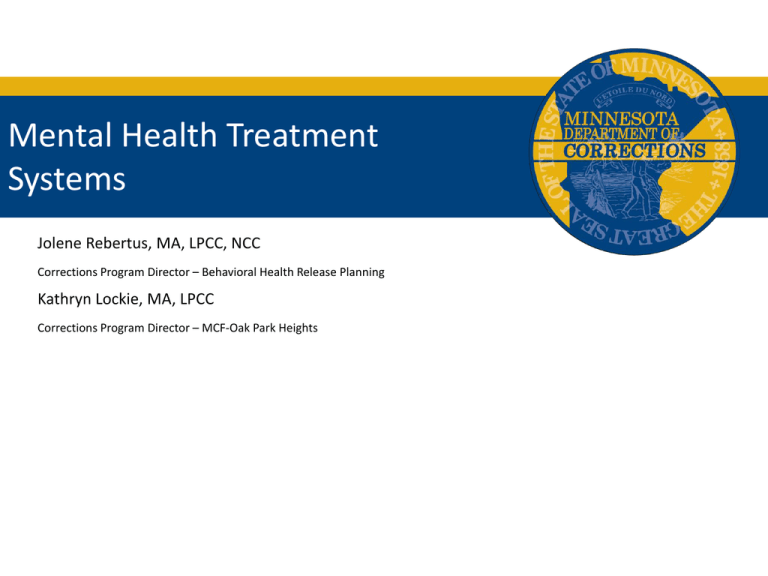
Mental Health Treatment
Systems
Jolene Rebertus, MA, LPCC, NCC
Jolene Rebertus, MA, LPCC, NCC
Corrections
Program
Director
Corrections
Program
Director – Behavioral Health Release Planning
Behavioral Health Release Planning
Kathryn Lockie, MA, LPCC
Corrections Program Director – MCF-Oak Park Heights
Treatment Systems
Overview
1.
2.
Review DOC treatment systems
Discuss offered release planning services
DOC Treatment Systems
Behavioral Health Mission
"To provide effective, evidence-based behavioral health
services that enhance facility and public safety, reduce
criminal recidivism, and foster healthier offender
functioning."
DOC Background: MH Services
DOC Treatment Systems
Behavioral health includes
Mental health
Chemical dependency
Sex offender
Release planning
200+ staff
All State employees
DOC Background: MH Services
DOC Treatment Systems
Mental Health Services by the numbers
Approx 25% adult males utilize ongoing mental health
services
Approx 22% adult males on psychotropic medications
Approx 65% adult females utilize ongoing mental health
services
Approx 68% adult females receiving psychotropic
medication
DOC Background: MH Services
DOC Treatment Systems
Continuum of Services
Available through self, professional, or institutional referral
ANY DEPARTMENT STAFF MAY REQUEST A MENTAL
HEALTH ASSESSMENT OF AN OFFENDER
Evaluations are provided at various levels of referral
and need
DOC Background: MH Services & DOC Division Directive 500.303
DOC Treatment Systems
Offender Intake Screening and Processing
New admit - mental health screen completed within 14
calendar days of admission
Release violator – mental health screen completed within
14 calendar days of admission
Transfer – behavioral health staff sending facility prepares
summary and need for follow up to receiving facility
MN DOC Division Directive: 202.040
DOC Treatment Systems
Mental Health Assessment
Suicidal ideation
History of suicidal behavior
Prescribed psychiatric medication
Current mental health complaint
Out/inpatient history
Substance use
Observation of appearance
Evidence of abuse or trauma
Current symptoms
Disposition
MN DOC Division Directive: 500.303
DOC Treatment Systems
Those with a history, suicidal ideation, and/or display symptoms
participate in further evaluation
File review
Additional clinical interviews
Obtaining collateral material from outside resources
Psychological testing
DOC Background: MH Services
DOC Treatment Systems
Mental Health Continuity of Care
Ensure offenders receiving mental health care in the
community are provided appropriate care during
admission, incarceration, transfer, and release
MN Department of Corrections Policy: 500.302
DOC Treatment Systems
INTERVENTION SERVICES
Level 1
Volunteer assistance
Referral to self-help groups
– AA
– NA
– Anger management
– Parenting
DOC Background: MH Services
Level 2
Provided by DOC
professional staff
Outpatient
intervention
Psychoeducational
groups
Psychotherapy
groups
Individual
psychotherapy
DOC Treatment Systems
INTERVENTION SERVICES
Level 3
Level 4
DOC professional staff
Acute level of mental
illness
Heightened level of supportive
Requires residential
services
care
Chronically mentally ill
Specialty assessment
Socially low functioning
Chronic mental health
Supportive Living Services (SLS)
care within a secure
Residential level services
environment
– Daily support
– Designated area
DOC Background: MH Services
DOC Treatment Systems
Additional Services
Psychiatric Services
All psychiatric providers are contract providers
Psychiatric medication management
Medical practitioners must provide non-neuroleptic,
psychotropic medications only when medically
indicated for treatment of mental illness
MN Department of Corrections Policy: 500.301 & 500.321
DOC Treatment Systems
Additional Services
Mental Health Services On-Call
1 or more licensed mental health providers are continuously
on-call to provide urgent mental health services
Handle situations by telephone
Schedule distributed
– Watch commander
– Master control
– Associate warden of operations
– Health services administrator
– All mental health providers
MN Department of Corrections Policy: 500.305
DOC Treatment Systems
Additional Services
Mental Health Observation - COS
Comprehensive mental health and suicide prevention
program
– Offender placed on restrictive conditions
– Physical and electronic observation
– Logging behavior
– Directly observed medication administration
– Behavioral health staff must meet with offender
daily
– Termination determined by behavioral health staff
MN Department of Corrections Policy: 500.300
DOC Treatment Systems
Psychiatry and outpatient services provided at each DOC facility
What is unique to each facility?
DOC Treatment Systems
MCF- Oak Park Heights
Mental Health Unit
Process-type groups
– Time to talk about person issues/struggles,
thoughts, feelings
Psychoeducation-type groups
– Educational components
» Symptom management
» Adjustment to prison
» MH cycle & interventions
DOC Treatment Systems
MCF- OPH
Mental Health Unit
CD Pre-treatment groups
– Does not fulfill mandatory CD requirements
– Help prepare for future treatment
– Resource for seeking CD information
Pre-release groups
– For offenders within 1 year of release
» Housing, employment, supervision,
medical/mental health aftercare
DOC Treatment Systems
MCF-OPH
Outpatient services
Offered groups
– “Doing Time”
– Poetry
– Outpatient MHU group
– Anger management
DOC Treatment Systems
MCF- Stillwater
Transitions Services Program (TSP)
Serious and persistent mental illness
Roughly 10 inmates
2 inmate mentors
Attend group counseling sessions 2x week
– General mental health education, symptom
management, process group
Expectation of actively working towards general
population, seeking employment, working knowledge
of dealing with mental illness
DOC Treatment Systems
MCF-Rush City
Supportive Living Services (SLS)
32 beds
2-3 groups a week
– Anger management
– Community/Social skills
– Depression management
– Grief process
– Special topics
– STEPPS
– Personal goals
DOC Treatment Systems
MCF- Lino Lakes
Supportive Living Services (SLS)
Serious mental illness and/or significant cognitive
impairment
Groups offered
– Adaptive living skills group
– Psychological education
– Daily living skills
– Mental health movie activity
– Art and gardening
– Recovery group
DOC Treatment Systems
MCF-LL
Outpatient services
Coping Skills group
– Offered 1x week
– Relaxation skills
– Problem solving
– Goal planning
– Sleep hygiene
Work readiness
– Provide variety of tasks while under staff supervision
– Allow to practice skills, working with others and self
discipline
DOC Treatment Systems
MCF- Shakopee
Women of Wellness (WOW)
Supportive living unit
Provides psycho-education, skills and therapy to
offenders in order to better manage mental health
symptoms
Goal to return to general population
21 days
DOC Treatment Systems
MCF-SHK
Women of Wellness – Pain Management (WOW-PM)
Women of Wellness – Transition (WOW-T)
21 days
Begin working
Women of Wellness – Extended (WOW-E)
Women of Wellness – General Population Aftercare
(WOW-GPAC)
Release Planning in Behavioral Health
http://www.youtube.com/watch?v=AcBg1qfNoeM&feature=rela
ted
Approach
Prevention through planning and action
MN DOC Release Planners
SPMI
SO
CD
Medical
TBI
Community “Philosophy”
Wisconsin
Minnesota
State population
5.6M
5.0M
Probation population
53K
130K
23-24K
9.5K
43%
7%
Prison population
% incarcerated
www.nicic.org/Features/StateStats
Mental Health
Release Planning
• Function as a mental health practitioner
• Assess and review client management needs
• Create individualized discharge plan aimed at
successful integration into the community
Mental Health Release Planning
Introduction
Significant increase in awareness of number of mentally ill
offenders in prison population
Results in homelessness, unemployment, hospitalizations,
subjection to abuse and exploitation, alcohol and drug
dependence
Mental Health Release Planning
Introduction
2002, MN State Legislature passed law requiring mental
health release planning for all SPMI offenders
Community mental health services preplanned prior to
release
Mental Health Release Planning
Importance
Enhance community safety
Reduce recidivism
Meet state legislatively mandated laws
Provide advanced notification to community social service
agencies
Mental Health Release Planning
Importance
To ensure offender access to state, county, and federal
health care
Transition mental health services from prison to
community
Medically based treatment that supports court’s objectives
and conditions for release
Best possible aftercare for SPMI offenders
Mental Health Release Planning
Definition of Serious and Persistent Mental Illness (SPMI)
A person has diagnosis of:
Schizophrenia
Bipolar Disorder
Major Depressive Disorder
Borderline Personality Disorder
Schizoaffective Disorder
Mental Health Release Planning
How to identify?
Past records
Pre-sentence investigations
Clinical records
Case notes
Police reports
Offender interview
Have you ever been hospitalized?
Have you seen a counselor or therapist?
Do you have a mental health diagnosis? Medications?
Mental Health Release Planning
•
•
•
•
•
Begin working with offender 120 days prior to release
Voluntary Service
Limits of Confidentiality
Assessment of need completed
Obtain emergency contact, recreational activities, etc.
Mental Health Release Planning
County Mental Health Case Management
Rule 79 Assessment
Each county has their own rule 79 assessment
Certifies a person with a serious and persistent mental illness
County involvement important in order to assist with
connecting offender to community mental health resources
Day tx.
MI/CD groups
Vocational programming
Housing Funds
Mental Health Release Planning
ARMHS-Adult Rehabilitative Mental Health Services
Medical Assistance required
Intensive Community services that focus on offender’s
mental health stability in community
Mental Health Release Planning
MN Department of Economic Assistance
GAMC (expired 02/28/11)
MN Care
MA Expansion (March 2011)
MNSure
SMRT
Food Stamps
Personal Needs Money
Mental Health Release Planning
Financial Benefits-Social Security
Multi-stage process
Referral phone call to SSA representative at 120 days
SSI phone interview with offender in prison
Completion of important paperwork
Possible psychiatric evaluation
SSI provide a means of support to pay for housing, food,
and increase the offender’s health insurance coverage
Mental Health Release Planning
Housing Placement
SPMI release planner involved in order to find appropriate
housing
Rule 25 assessment for MI/CD programming
Collaboration with various providers
Community agencies
– Case manager
– Housing manager
– Economic Assistance
DOC case manager
Field agent
Mental Health Release Planning
Community appointments
Outpatient Psychiatry-medication monitoring
Release medication
– 30 day supply
– Written script #30
Outpatient Psychology-primary therapist
Community Treatment Program
Sex offender
MI/CD
DBT
Day treatment
Mental Health Release Planning
Employment Resources
Vocational Rehabilitation Services – MN Field Offices
AMICUS
TASKS Unlimited
Goodwill – Easter Seals
New Leaf Workshop
Mental Health Release Planning
Community Support
Crisis phone numbers and outreach
Local hospitals
AA/NA meeting directories
Transit information
The essentials
Clothing, food shelves, shelters
Mental Health Release Planning
Prevention Plan
Reviewed and processed with the offender
To improve his/her cognitive thinking skills
Build self-confidence in managing their mental health in
the community
Mental Health Release Planning
Summary and Key Points
Frequent communication with various parties
Within Department of Corrections
Community mental health agencies
Field agents
Always aware of security of facility
Limits of confidentiality
Mental Health Treatment
Systems
Look back
DOC Treatment Systems
Mental Health Release Planning
Mental Health Treatment
Systems
QUESTIONS


